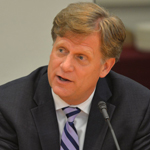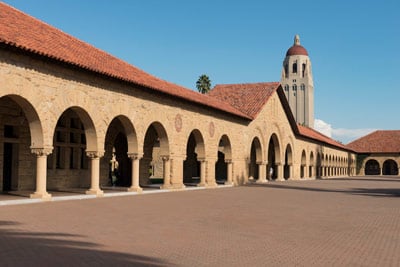Leaders in Higher Education
THIS GUIDE IS NO LONGER ACTIVE. For the current FP Guide, click here.
MICHAEL A. McFAUL, Director and Senior Fellow
Stanford University, Freeman Spogli Institute for International Studies
What happens when a graduate program is the brainchild of a leading university research institute?
“We want to be the West Coast leader for training future leaders of the world with respect to global affairs,” says Michael A. McFaul, former ambassador to Russia and director of Stanford University’s Freeman Spogli Institute (FSI) and its Ford Dorsey MA in International Public Policy (MA-IPP) program.
A key to that goal is FSI’s innovative focus on future global challenges: Researchers are examining the global surge in populist movements and what it means for established democratic rules and institutions. The institute’s Cyber Initiative team is working with Stanford’s School of Engineering to understand relationships between cyber technologies and security, governance, and work. FSI’s program on American Democracy recently co-hosted a conference on “Democracy and Its Discontents” to discuss the rise of illiberal democracy in Eastern and Central Europe, the rise of populist parties in the U.S. and Western Europe, growing income inequality and perceptions of political corruption, and the curtailing of voting rights.
FSI is also training a new generation of future leaders to help solve such challenges. Reflecting the innovation and ethos of Silicon Valley, the MA-IPP program’s groundbreaking curriculum emphasizes policymaking and implementation.
“Our new courses and co-curricular opportunities will rival those of leading international affairs schools on the East Coast, while carrying their own distinct Stanford signature,” says McFaul.

“What I was taught about international relations during my education at Stanford had a direct impact on my work in the White House and in Moscow.” –Michael A. McFaul, former Ambassador to Russia and Director, Freeman Spogli Institute for International Studies, Stanford University
“We don’t think all policy is made in Washington, D.C. It’s also made in Beijing, Silicon Valley, Moscow, and other places,” says McFaul, a veteran of the White House and the U.S. Department of State. “Silicon Valley might be as impactful as the State Department or Capitol Hill.”
With courses set to begin in fall 2018, the MA-IPP program will offer innovative courses in cybersecurity, big data, impact evaluation, the decision sciences, and other areas where policy meets technology. It will draw deeply on the resources of FSI faculty, who rank among the best in the country working at the intersection of scholarship and public affairs.
 In addition to revamping its current MA degree and joint programs with Stanford Law School and the Graduate School of Business, the Ford Dorsey program will expand its joint-degree options and will actively engage Stanford faculty who have experience and expertise in policymaking and implementation.
In addition to revamping its current MA degree and joint programs with Stanford Law School and the Graduate School of Business, the Ford Dorsey program will expand its joint-degree options and will actively engage Stanford faculty who have experience and expertise in policymaking and implementation.
The MA-IPP program will include a diverse mix of 25 students. “The beauty of a small, highly selective program is that peers learn as much from each other as they learn from faculty,” says McFaul. It will draw students from the private sector, NGOs, and government, including the military. “It really does change the conversation to have soldiers in the room,” McFaul notes.
The goal: to produce leaders who will engineer policy and innovation in national governments, non-governmental organizations, international organizations, and private firms.
The key: to empower students to take ideas discussed in an academic setting and apply them.
“We think good research can inform good policy,” says McFaul. “What I was taught about international relations during my education at Stanford had a direct impact on my work in the White House and in Moscow.”
McFaul earned his BA and MA at Stanford before completing his doctorate at Oxford University as a Rhodes Scholar. He joined the Stanford faculty in 1995 and also served for five years in the Obama administration, first as special assistant to the president and senior director for Russian and Eurasian Affairs at the National Security Council, then as U.S. ambassador to Russia.
Graduate Degree Program Options:
• MA in International Public Policy (MA-IPP)
• MA/MBA, MA/JD, and other joint degrees
Visit the Request Info page to receive information from the schools.
Contents
- Leaders in Higher Education
- Johns Hopkins School of Advanced International Studies (SAIS)
- Georgetown University, Walsh School of Foreign Service
- Stanford University, Freeman Spogli Institute for International Studies
- Texas A&M University, Bush School of Government and Public Service
- New York University School of Professional Studies, Center for Global Affairs
- UC San Diego, School of Global Policy and Strategy
- University of Denver, Josef Korbel School of International Studies
- University of Washington, Henry M. Jackson School of International Studies
- Arizona State University, Center on the Future of War
- Georgetown University School of Continuing Studies
- Syracuse University, Maxwell School of Citizenship and Public Affairs; and Center for Strategic and International Studies
- University of Kent, Brussels School of International Studies
- Sciences Po, Paris School of International Affairs
- Columbia University, School of International and Public Affairs (SIPA)
- The Fletcher School of Law and Diplomacy at Tufts University
- University of Notre Dame, Keough School of Global Affairs
- Arizona State University, Thunderbird School of Global Management